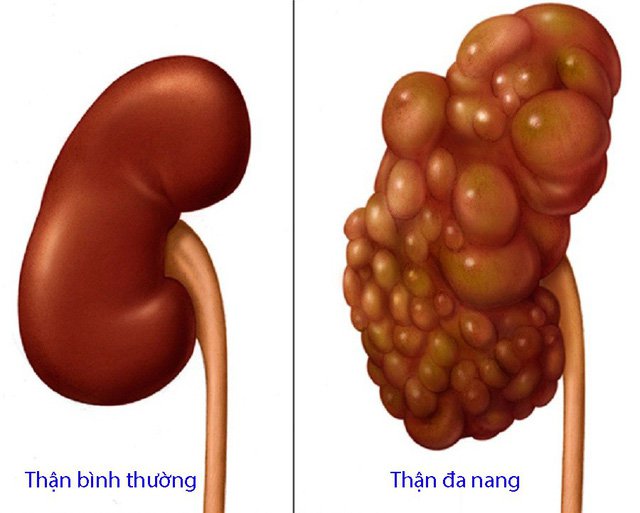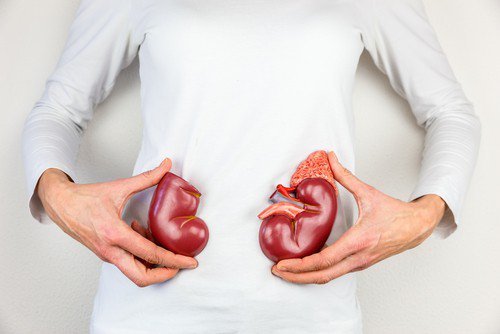The article is consulted professionally by Master, Dr. Nguyen Thi Thanh Thuy – Doctor of Renal Medicine – Dialysis – Kidney Transplantation – Medical Examination and Internal Medicine Department – Share99 Central Park International Health Hub. The doctor has more than 15 years of experience in diagnosing and treating internal kidney disease, hemodialysis, pericarditis, pre-transplant screening and post-transplant monitoring.
Polycystic kidneys are hereditis, which can lead to end-stage renal failure, which is life-threatening. Understanding the genetics of polycystic kidney disease as well as symptoms and how to prevent dangerous complications of the disease is very important.
1. Heredity of polycystic kidney disease
Polycystic kidney disease is a condition where there are many cysts in the kidneys that cause the kidneys to enlarge. These are abnormal cysts containing internal fluid, which differs from normal types of cysts. Polycystic kidney disease affects the functioning of the kidneys, which can lead to chronic kidney disease, end-stage renal failure.

Polycystic kidneys are heredity, divided into 2 types of heredity according to the diving and genetic properties according to the dominant condition
- Heredity of polycystic kidneys by diving properties: common in adolescents
- Heredity-based heredity-based polycystic kidneys: common in middle age
Very few cases of polycystic kidney disease arise when the patient is young. If there are people in the family with polycystic kidneys, the remaining members need to go to the hospital for examination.
Polycystic kidney disease not only affects kidney function, but can also spread to other parts of the body such as pancreas, spleen, ureter, ureter … and lead to dangerous complications.
2. Symptoms of polycystic kidney disease
Cysts can appear on both sides of the kidneys. In many cases, patients often do not have clear manifestations, until the disease progresses severely there are specific signs. Therefore, patients often detect the disease by chance through ultrasound or regular medical examinations.
The most recognizable symptoms of polycystic kidney disease include:
- Abnormally large abdomen due to altered renal size: The appearance of water follicles causes the kidneys to deform, the cyst grows larger, the kidneys bulge accordingly. Each kidney can be increased to 7-8 kg. The process of increasing the size of the kidneys can be up to ten years.
- Abdominal pain, back pain or side pain: About 20-30% of patients with renal polycystic present with abdominal pain, or back pain, smoldering pain, abdominal pain. The larger the cyst, the more intense the level of pain. Acute pain may be caused by bleeding in the cyst, cystic infection or urinary tract obstruction due to blood clots…
- Repeated urination
- Hematoma: 30-50% of polycystic kidney patients have had at least 1 hematoma. Hemating is caused by bleeding in the cyst, which usually occurs after injuries, bumps, including minor injuries. There are also cases of randomly appearing hematoma. The larger the kidneys, the greater the cyst, the greater the risk of hematoma.
- Headache, fever with cystic infection
- Urinary tract infections or kidney infections: Urinary disorders, pissing, urination …
- Kidney stones
- Renal failure.

3. Complications of polycystic kidney disease
Common complications of polycystic kidney disease are hypertension. High blood pressure is dangerous, increasing the risk of heart disease and leading to stroke.
Polycystic kidney disease without timely treatment can cause loss of renal function. The ability to filter the blood, remove waste products from the body of the kidneys works gradually, imbalances the body's fluids and electrolyses. The person may have hypertension, which leads to renal failure.
Renal polycystic can stimulate the growth of cysts in the liver. The older the patient, the more likely they are to develop liver cysts.
People with polycystic kidney disease should be screening for cerebral aneurysms, especially in people before age 50, those with hypertension or a family history of aneurysms. A brain aneurysm contains the risk of rupture at any time, causing a brain haemorrhage.
25% of adults with polycystic kidneys may be accompanied by mitral valve disease. Abnormalities in the heart valve cause the valve's functioning to be affected, the valve does not close properly, the blood can flow backwards threatening the patient's life.
Pregnant women with polycystic kidneys may have complications with pre-seizure complications.
For direct advice, please click hotline number or register online HERE. In addition, you can register for remote consultation HERE
- Diagnosis of ovarian cysts
- Fertility in people with ovarian cysts
- The role and function of liver enzymes – Causes of increased liver enzymes (Period II)

